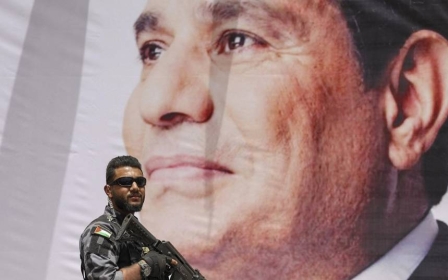UK sells warships to Egypt for first time in 30 years

The UK government plans to sell warships to the Egyptian navy for the first time in three decades, it announced on Friday, in a deal criticised by human rights groups.
In a statement, the UK Ministry of Defence said it had signed a "landmark deal" to sell two Royal Fleet Auxiliary ships - Fort Austin and Fort Rosalie - to Egypt, a move which they said could "support UK jobs."
Jeremy Quin, defence procurement minister, said "both the UK and Egyptian navies continue to strengthen relations to maintain peace and security in the region."
'The Sisi regime ruthlessly suppresses all opposition, imprisoning thousands and practicing torture and murder as a matter of routine'
- Samuel Perlo-Freeman, CAAT
The statement described the sale as the "first military vessel deal with Egypt in more than three decades" and added that negotiations were underway for a "refurbishment contract".
The sale has been criticised by activists, however, who have voiced concerns about the Egyptian government's human rights record and criticised international powers turning a blind eye to a major crackdown launched by President Abdel Fattah el-Sisi since he assumed power in 2013.
Stay informed with MEE's newsletters
Sign up to get the latest alerts, insights and analysis, starting with Turkey Unpacked
Samuel Perlo-Freeman, a research coordinator with Campaign Against the Arms Trade (CAAT), told Middle East Eye that it was disturbing to see the UK selling warships to a "brutal military dictatorship".
"The Sisi regime ruthlessly suppresses all opposition, imprisoning thousands and practising torture and murder as a matter of routine," he said.
"Supplying such major military equipment, treating the Egyptian military as a valued partner, provides the regime a seal of approval and legitimacy, while disheartening opposition. Once again the UK places industry interests and geopolitics over human rights."
Human rights crackdown
Since overthrowing the democratically-elected government of President Mohamed Morsi, Sisi has led a brutal suppression of dissent, jailing more than 60,000 activists and imposing strict censorship measures on public discourse.
Though he has consistently denied that there are political prisoners in Egypt - framing the crackdown as part of a fight against terrorism - rights groups have accused him of creating a state of fear in the country.
In a report last month, Amnesty accused the Egyptian security agencies of "persistent intimidation and harassment" of human rights defenders.

"Activists and human rights defenders said at every summons NSA officers regularly threatened them with arrest and prosecution unless they attended interrogations, and raided the homes of those who failed to appear," said Amnesty.
"As a result, many are too scared to express their opinions or participate in political activities and some have been driven into exile."
Despite these concerns, foreign countries have continued to maintain both aid and arms sales to Egypt.
Since 2011, the UK government has licenced $297.6m worth of arms to Egypt, according to CAAT.
In 2014, the US Congress began imposing human rights conditions on $300m of the military aid to Egypt, but former presidents Barack Obama and Donald Trump both issued national security waivers to bypass the restrictions.
Last month, after what was described in the Washington Post as "lengthy deliberations", US State Department officials and congressional aides said the Biden administration would be providing $170m to Egypt for counterterrorism, border security and nonproliferation.
They said an additional $130m would be provided, on condition that the Egyptian government end its harassment and repression of human rights organisations in the country and drop charges against or release 16 individuals who the US government had highlighted in discussion with Egypt since June.
“If they complete the human rights criteria that we laid out for the Egyptians, they also get the $130m," said one official.
Middle East Eye delivers independent and unrivalled coverage and analysis of the Middle East, North Africa and beyond. To learn more about republishing this content and the associated fees, please fill out this form. More about MEE can be found here.




